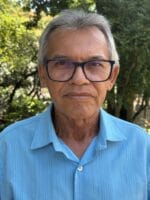Inside Story for Friday 10th of October 2025
One of the Thirteenth Sabbath mission projects for this quarter is a church at Pernambucano Adventist Academy in Brazil’s state of Pernambuco, where Inácio Manoel lives. Thank you for planning a generous offering. Watch a short YouTube video of Inácio at: bit.ly/Inacio-Brazil.
A woman spewed hatred when Inácio Manoel knocked on her door to offer Seventh-day Adventist books in Brazil. “I hate Christians!” she yelled.
Inácio was surprised. It was his first house on his first day of work as a literature evangelist offering books and Bible studies.
He and a friend went to the next house. A big dog barked ferociously from the yard. His friend mumbled something about the first house having an angry woman and the second house having an angry dog.
“Don’t worry,” Inácio said. “God is with us.”
A woman came out of the house and led the dog away. Then she invited Inácio and his friend to come in. The three had a heart-to-heart conversation, and the woman told of her struggles since her husband had been sent to prison. The next Sabbath, the woman came to church with her three young children. Inácio was amazed. He told God that he wanted to lead people to Him for the rest of his life.
Inácio’s biggest surprise, however, came from the third house that he and his friend visited on that first day of work. The woman who lived there, Edileuza, agreed to Bible studies on Saturday afternoons. As they read week after week, they came to the Bible truth about the seventh-day Sabbath. Edileuza worked as a manicurist and a housekeeper, and she didn’t see any possibility of resting on Saturdays.
“I make the most money that day of the week,” she said. “What can I do?”
“Don’t worry,” Inácio said. “God will help. He has something better.”
At the next Bible study, Edileuza said she had met a stranger on the street who had asked if she knew a good housekeeper. The job didn’t require any work during the Sabbath hours of sundown Friday to sundown Saturday.
Edileuza beamed as she shared the story with Inácio. “Now my salary is three times more than I earned as a manicurist and a housekeeper,” she said.
Edileuza was baptized. Later, the rest of her family followed suit.
Inácio, now 68, has led four to 11 people to baptism every year for the past 36 years. Everywhere he goes, he carries Bible lessons with him. His nightly prayer is: “Lord, put someone in my path, so I can share Your love.”
“I can live without anything in the world, but not without Bible studies,” he said.
 (0)
(0)Source: https://ssnet.org/blog/25d-02-inside-story-don-t-worry-god-will-help/






